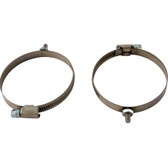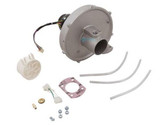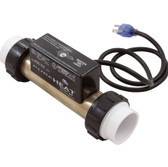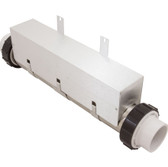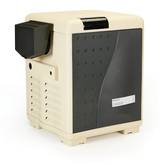 Loading... Please wait...
Loading... Please wait...
- Home
- HEATERS
Categories
Popular Brands
- 1" TUBE HEATERS, LAING STYLE
- BAPTISMAL EQUIPMENT SYSTEMS
- BALBOA REVOLUTION HEATER
- COATES
- CPVC PIPE NIPPLES
- COMPLETE BAPTISTRY HEATERS
- COMPLETE BATH HEATERS
- COMFORTZONE/HAYWARD
- COMPLETE SPA HEATERS
- ELECTRIC HEATER
- GAS HEATERS
- HAYWARD
- HEATER MANIFOLDS
- HEAT SINKS
- JANDY HEATERS
- PENTAIR
- PORTABLE BAPTISMAL SYSTEMS
- PURE HEAT BATH HEATERS
- PUREX ISLANDER / TROPIC AIR / MANATEE
- RAYPAK HEATERS
- STA RITE MAX-E-THERM
- TERMINAL BLOCK
- TELEDYNE LAARS SPA HEATERS
HEATERS
Whether you own an expansive inground pool, a space-saving above-ground pool, or a soothing spa, the right heater can drastically improve your enjoyment. By maintaining an inviting water temperature, heaters allow for a longer swimming season, more comfortable spa soaks, and an overall improved aquatic experience.
But with the vast array of heaters in the market, including electric spa heaters, gas pool heaters, and even solar options, making the right choice can seem daunting. Different setups have different requirements.
The perfect heater for an inground pool might not be the same as one needed for an above-ground pool or a spa. Various factors come into play – from the size of the pool or spa, the area's climate, and the desired temperature to your budget.
In this guide, we will navigate through the world of pool and spa heaters, delving into the various types, their functionalities, and how they can benefit you. We will also explore some of the industry's leading brands, such as Hayward pool heaters and Pentair pool heaters, shedding light on what makes them the popular choice for many pool and spa owners.
Types of Pool and Spa Heaters
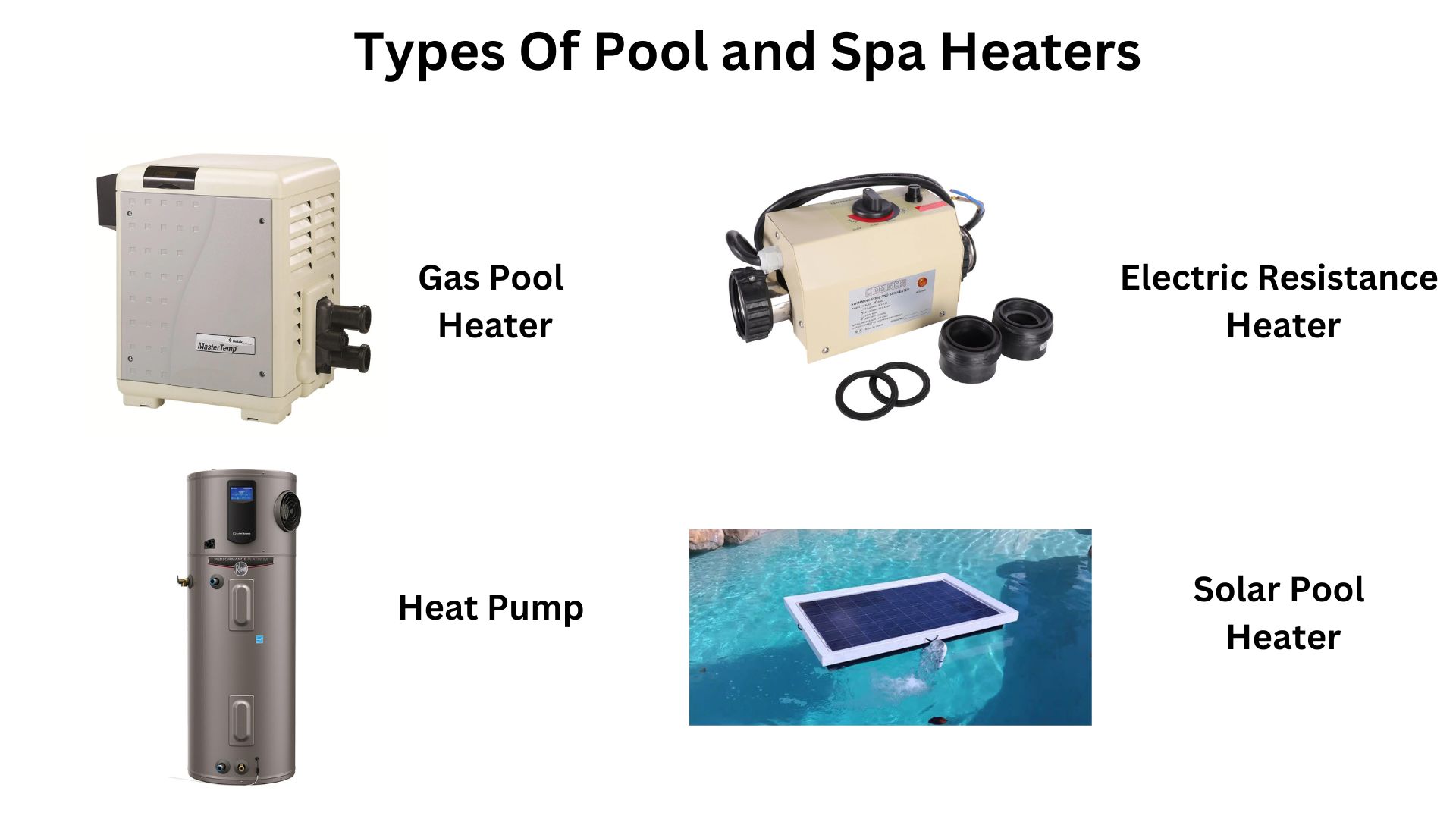
It's not one-size-fits-all when it comes to keeping your pool or spa invitingly warm. There are many heaters to choose from, each with its distinct operational method, benefits, and potential drawbacks. Understanding these nuances is the first step toward finding the ideal fit for your specific needs.
-
Gas Pool Heaters
These units, such as the well-known Hayward heaters and Raypak pool heaters, utilize propane or natural gas to heat your pool or spa. Their key advantage lies in their rapid heating ability, which can quickly bring your pool or spa to the desired temperature, regardless of external conditions.
This makes them especially suitable for pools and spas that aren't used regularly but require fast heating. However, their operating costs can be higher due to the cost of gas, and they're less energy-efficient than other heater types.
-
Electric Resistance Heaters
As the name suggests, electric resistance heaters generate heat through electric currents. They pass electricity through resistive elements, and this heat is then transferred to the water.
Brands like Pentair offer reliable electric resistance heaters that don't depend on the surrounding air temperature, making them an excellent choice for spas and small pools. However, their energy usage can result in high operating costs.
-
Heat Pumps
Heat pumps, such as those offered by Jandy, are an energy-efficient heating solution. They extract heat from the air or water around them and use it to warm up your pool or spa. There are two types: air-source and water-source (or geothermal) pumps.
While their initial cost might be higher, they have lower operating costs in the long run, making them a cost-effective choice for regular usage.
-
Solar Pool Heaters
Solar pool heaters are the way to go if you're looking for the most energy-efficient and eco-friendly solution. They harness the sun's power to heat your pool or spa, involving minimal operational costs. Solar heaters install solar collectors in a sunny area, which circulates the pool water to be heated.
However, they rely heavily on sunny weather and can take longer to heat the water. Therefore, they're best suited for areas with ample sunlight and for pool owners who don't mind a slower heating process.
Understanding these pool and spa heaters categories is the foundation for choosing the perfect heating solution. Whether you're considering inground pool heaters or above ground pool heaters, gas or solar, the right knowledge can lead you to the perfect match for your pool or spa.
Understanding the Importance of Pool and Spa Heaters
Investing in a pool or spa heater can make a world of difference in the way you enjoy your aquatic haven. They offer many benefits, making them an essential addition to your pool or spa setup.
-
Comfort
The added comfort is the most immediate benefit of a pool or spa heater. Nothing compares to the feel of stepping into a perfectly warmed pool or spa. Whether it's for a quick dip or a lengthy swim, maintaining a comfortable temperature ensures an enjoyable experience for all.
-
Extended Swim Season
Without a heater, pool usage can be restricted by weather and seasonal changes. Pool and spa heaters, be they gas pool heaters like those offered by Jandy or solar options, provide a solution. You can extend your swim season and maximize your investment by year-round maintaining the desired water temperature.
-
Health Benefits
Warm water is known to offer numerous health benefits. It can help soothe muscles, promote relaxation, and even offer a form of low-impact exercise. Spa heaters, especially, can turn your spa into a therapeutic retreat.
-
Increased Property Value
Installing a pool or spa heater can also contribute to your property value. A heated pool or spa is a sought-after feature for potential homebuyers, making it a worthwhile investment.
-
Adaptability
Whether you own an above-ground or an inground pool, there's a heater out there. Even the type of heater can be chosen based on your specific needs - from quick heating gas models to eco-friendly solar options.
Given these benefits, it's clear that adding a heater can significantly improve your pool or spa experience. It can transform your pool or spa from a mere luxury to a versatile amenity that can be enjoyed year-round, providing comfort, health benefits, and increased property value.
Whether you opt for a Hayward pool heater, a Raypak pool heater, or an electric spa heater, the investment will surely bring warmth to your pool or spa and your overall experience.
Popular Brands of Pool and Spa Heaters
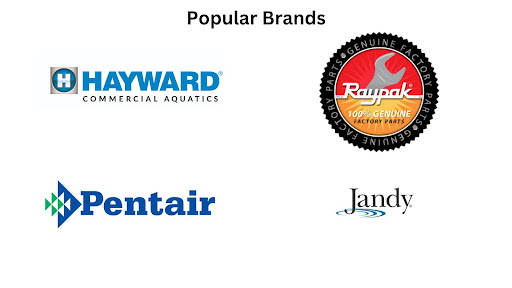
Quality, durability, and efficiency are key considerations when choosing a pool or spa heater. To help guide your decision, we have outlined some of the leading brands in the industry, each known for their high-performance products.
Hayward Pool Heaters
Hayward is a household name in the pool and spa industry. Their heaters, available for both inground and above ground pools, are renowned for their durability and efficiency. Whether you're considering gas pool heaters or heat pumps, Hayward offers reliable solutions designed to ensure optimum comfort and extended swimming seasons.
Raypak Pool Heaters
Another industry leader, Raypak, provides a wide range of heaters known for their cutting-edge technology and ease of use. Raypak pool heaters offer advanced features and efficient performance and are built to last. They're an excellent choice for any pool or spa owner seeking value and longevity.
Jandy Pool and Spa Heaters
Jandy heaters deliver in terms of both functionality and design. They offer energy-efficient heat pumps and high-performance gas heaters that are easy to install and operate. With a Jandy heater, you're investing in robustness, performance, and a prolonged lifespan for your pool or spa heating system.
Pentair Pool Heaters
Pentair is celebrated for its high-quality pool and spa solutions. Their heaters are efficient, reliable, and available in various models to suit different needs and budgets. With a focus on energy efficiency and advanced technology, a Pentair pool heater can be a cost-effective addition to your pool or spa.
By understanding the strengths of these top brands, you can make a well-informed decision about which heater aligns with your specific needs.
Be it a Pentair pool heater for its advanced technology, a Jandy pool heater for its reliability, or a solar heater for an eco-friendly approach, choosing a well-reputed brand is the first step towards a warm and enjoyable pool or spa experience.
Taking Care of Your Investment: Pool and Spa Heater Maintenance
Proper maintenance is key to ensuring the longevity and efficiency of your pool and spa heaters. Here are some crucial steps to keep your heaters functioning optimally.
-
Regular Inspection: Schedule regular check-ups for your heater, whether it's a gas model like a Jandy pool heater or an electric spa heater. An annual professional inspection can help detect and address any issues before they become major problems.
-
Cleaning: Regularly clean the heater's exterior and the area around it. Debris, leaves, and dirt can block ventilation and impact its efficiency. For gas pool heaters, ensure the burner ports are free of any blockages.
-
Proper Circulation: Make sure your pool's circulation system is working effectively. Good water flow is necessary for the efficient operation of the heater.
-
Check Pool Chemistry: Regularly test your pool water for the correct chemical balance. Corrosive water can damage your heater and reduce its lifespan.
-
Winterizing: If you live in an area with common freezing temperatures, make sure to winterize your pool heater properly. This typically involves turning off the heater, draining any remaining water, and protecting it from the elements.
By taking good care of your pool or spa heater, you can maximize its performance and lifespan. Remember, regular maintenance can save you costly repairs in the future and ensure that your Hayward, Raypak, or Pentair pool heater continues to provide comfortable temperatures for enjoyable swims and soaks all year round.
Installation of Pool and Spa Heaters
Once you have selected the perfect heater for your pool or spa, the next step is installation. Proper installation is critical to ensure your heater's safety, efficiency, and longevity.
Professional Installation
The installation process can be pretty complex, involving electrical and potentially gas connections, depending on the type of heater. While there may be a temptation for DIY installation, engaging a professional for this task is typically recommended. Professional installers possess the necessary knowledge and experience to ensure the installation is safe, meets local codes and regulations, and optimizes the heater's performance.
Location
The location of your heater can significantly impact its efficiency. Heaters should be installed as close as possible to the pool or spa and in a location that promotes adequate ventilation. For solar pool heaters, solar collectors should be installed in an area that receives ample sunlight.
Accessibility
Your heater should be installed in an area that's easily accessible for maintenance and repairs. Remember, you'll need to inspect and clean your heater regularly.
Infrastructure
Before the installation, ensure your pool or spa’s infrastructure can accommodate the heater. Check the compatibility of your existing circulation, filtration, and electrical or gas supply.
Safety Measures
Ensure necessary safety measures are in place, such as proper grounding for electric heaters and ventilation for gas heaters.
Remember, proper installation is key to maximizing its benefits, whether it's a Hayward pool heater, Jandy spa heaters, or solar pool heater. With the correct installation, you'll be one step closer to enjoying a perfectly heated pool or spa.
Choosing the Right Heater for Your Pool or Spa
Choosing the right heater for your pool or spa is crucial for ensuring comfort, efficiency, and longevity. Several factors must be considered as you navigate your way to the perfect heating solution.
Size of Your Pool or Spa
The size of your pool or spa is a significant factor in determining the right heater. Larger pools and spas require more powerful heaters, while smaller ones may not require as much heating capacity.
Location and Climate
Your geographical location and climate can also influence the type of heater you should choose. A solar pool heater can be a cost-effective and sustainable choice if you live in a region with ample sunshine throughout the year. For cooler climates or pools and spas requiring rapid heating, a gas heater or heat pump could be a more suitable option.
Usage
How frequently you plan to use your pool or spa and the time of year you'll use it also matter. For occasional use, a fast-acting gas heater could be ideal. If you plan to use your pool or spa regularly throughout the year, a heat pump or solar heater may be more economical due to its lower operating costs.
Energy Efficiency
Energy efficiency is another critical aspect to consider. While solar heaters and heat pumps may have higher upfront costs, they can save you money in the long run due to their energy-efficient operation.
Budget
Your budget will undoubtedly play a role in your decision. Consider both the initial cost of the heater and its ongoing operational costs. While some heaters may be more affordable to install, they could have higher operational costs, and vice versa.
Brand Reputation
The brand's reputation for quality and reliability should also be considered. Brands such as Hayward, Jandy, Pentair, and Raypak are well-known for their high-quality pool and spa heaters.
Choosing the right pool or spa heater is a balance between your specific needs, preferences, and budget. Whether you opt for a gas pool heater, an electric spa heater, or a solar pool heater, ensure that it's a fit that will provide you with an enjoyable and comfortable swimming or spa experience for years to come.
Troubleshooting Common Issues
Like any appliance, pool and spa heaters can encounter issues over their lifespan. It's useful to know some common problems and their potential solutions. However, please remember that safety is paramount, and some issues require professional assistance.
-
Heater Won't Turn On
This could be due to a power supply issue. Check your breaker box to ensure the heater's circuit hasn't tripped. If your heater is gas-powered, check that the gas supply valve is open and the pilot light is lit.
-
Insufficient Heating
If your pool or spa isn't reaching the desired temperature, the heater's size might not be adequate for your pool or spa's size. Other issues could be a dirty filter, obstructed vents, or improper gas pressure in gas heaters.
-
Heater Cycles On and Off
If your heater turns on and off continuously, there might be an issue with the thermostat, a dirty filter, or inadequate water flow. Ensure the thermostat is set correctly, the filter is clean, and the pool's circulation system works properly.
-
The heater is Noisy
Unusual or loud noises can indicate a range of issues. A low rumbling could mean the gas pressure is incorrect in a gas heater, while a high-pitched whine might be a sign of a failing motor. These issues typically require professional attention.
-
High Energy Bills
If your energy bills have increased unexpectedly, your heater may be working harder than it should. This can be due to a dirty filter, a malfunctioning thermostat, or improper water chemistry.
Remember, if you're unsure or uncomfortable troubleshooting the issue yourself, it's always best to call in a professional. Regular maintenance of your pool or spa heater - be it a Hayward heater, Jandy spa heaters, or a Raypak pool heater - will also go a long way in preventing many common issues and keep your heater running efficiently for longer.
Frequently Asked Questions
What type of pool heater is most efficient?
Heat pumps and solar pool heaters are generally the most energy-efficient. Heat pumps use ambient air to heat the water, while solar heaters use the sun's energy, making their operational costs lower in the long run.
How long do pool and spa heaters typically last?
With regular maintenance, a pool or spa heater can last anywhere from 5 to 15 years, depending on the type of heater, its usage, and the overall care taken.
Can I install a pool or spa heater myself?
While some heaters come with DIY-friendly installation instructions, hiring a professional for installation is typically recommended. This is particularly true for gas and electric heaters, where incorrect installation can lead to safety hazards and compromise the heater's efficiency.
What size heater do I need for my pool?
The size of the heater needed depends on the size of your pool or spa, the average temperature of your location, and the desired water temperature. A professional can help you calculate the ideal heater size.
Why is my pool heater, not heating?
Several issues can lead to a heater not warming your pool or spa. It could be due to inadequate gas or power supply, a faulty thermostat, a dirty filter restricting water flow, or even the heater's size inadequate for your pool or spa.
How can I make my pool heater more efficient?
Regular maintenance, ensuring the correct water chemistry, using a pool cover to reduce heat loss, and placing the heater in a location that promotes maximum efficiency are some ways to enhance the efficiency of your pool heater.
Conclusion
Choosing and maintaining the right heater for your pool or spa can seem daunting, but with the correct information and guidance, it doesn't have to be. By understanding the types of heaters available - from gas heaters to electric spa heaters and solar pool heaters - and their individual advantages, you can make an informed choice that best suits your needs, budget, and lifestyle.
Remember, brands such as Hayward, Jandy, Pentair, and Raypak provide reliable options across all types of heaters. In the end, a well-chosen and maintained pool or spa heater can greatly enhance your swimming or relaxation experience, providing you with warmth and comfort throughout the year.


